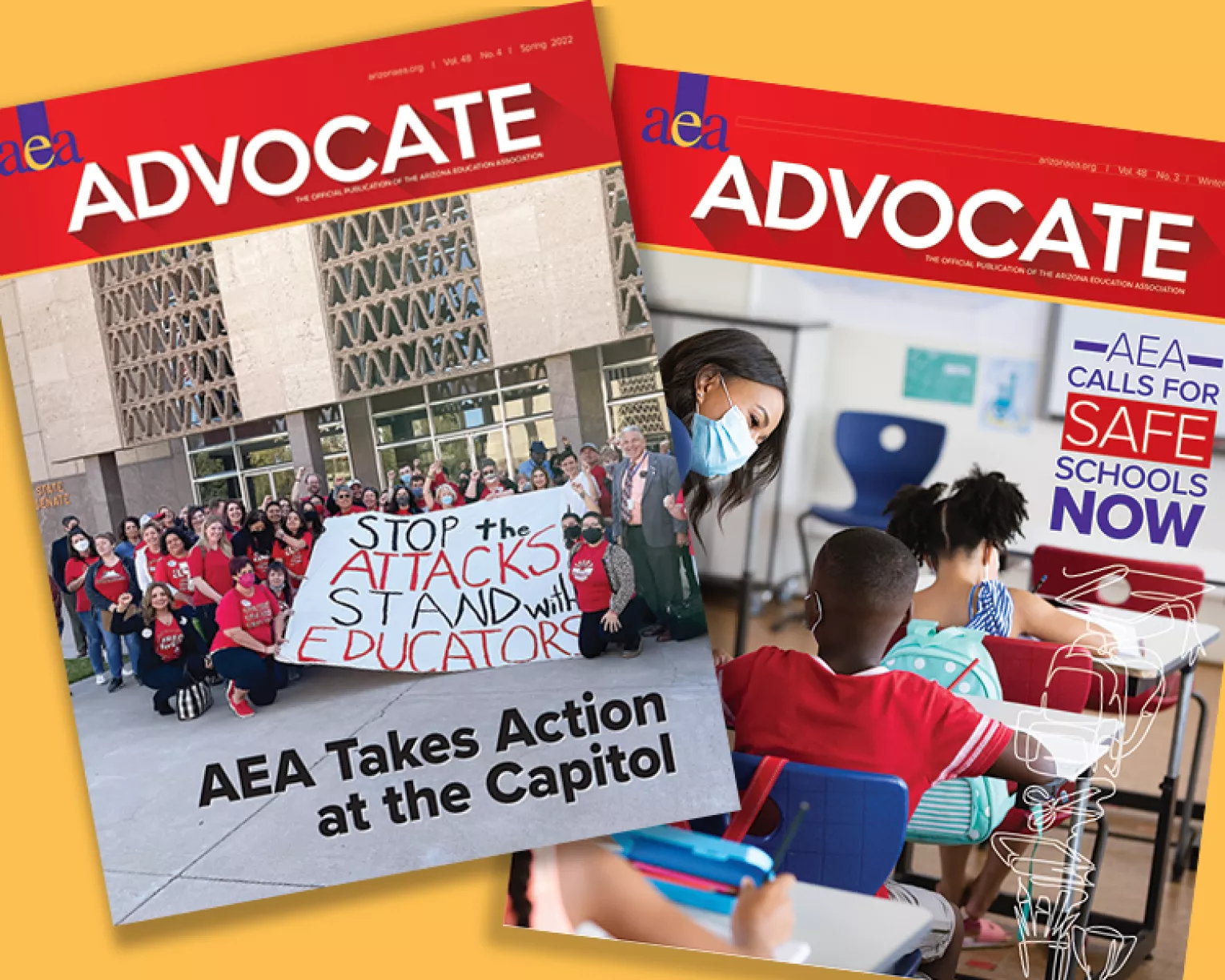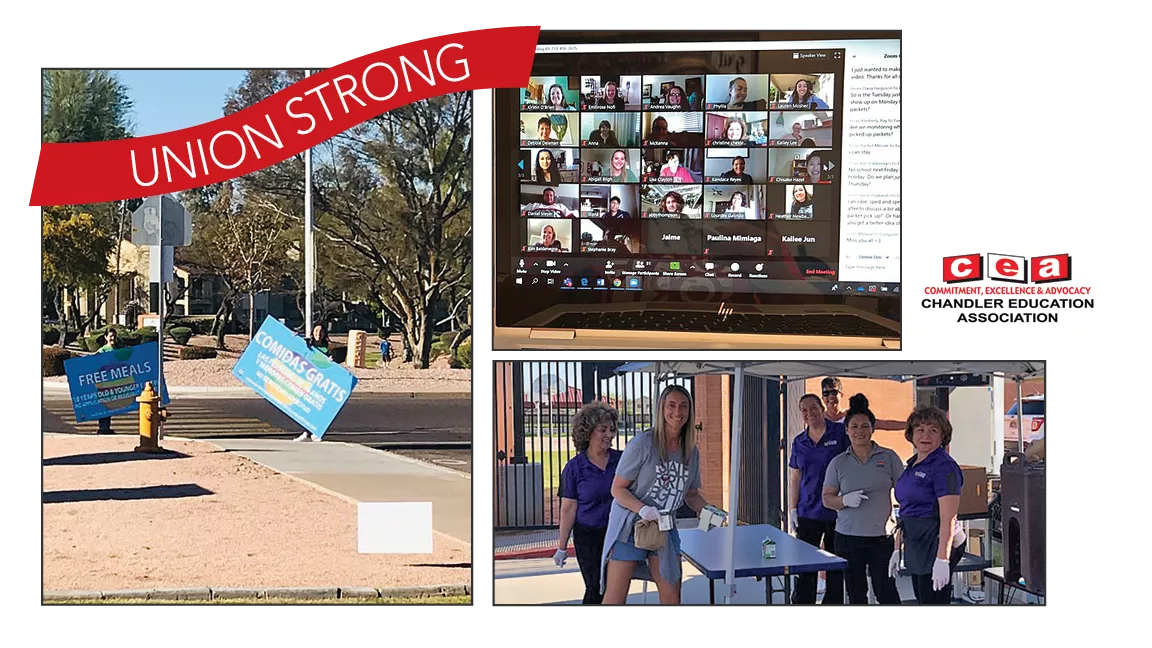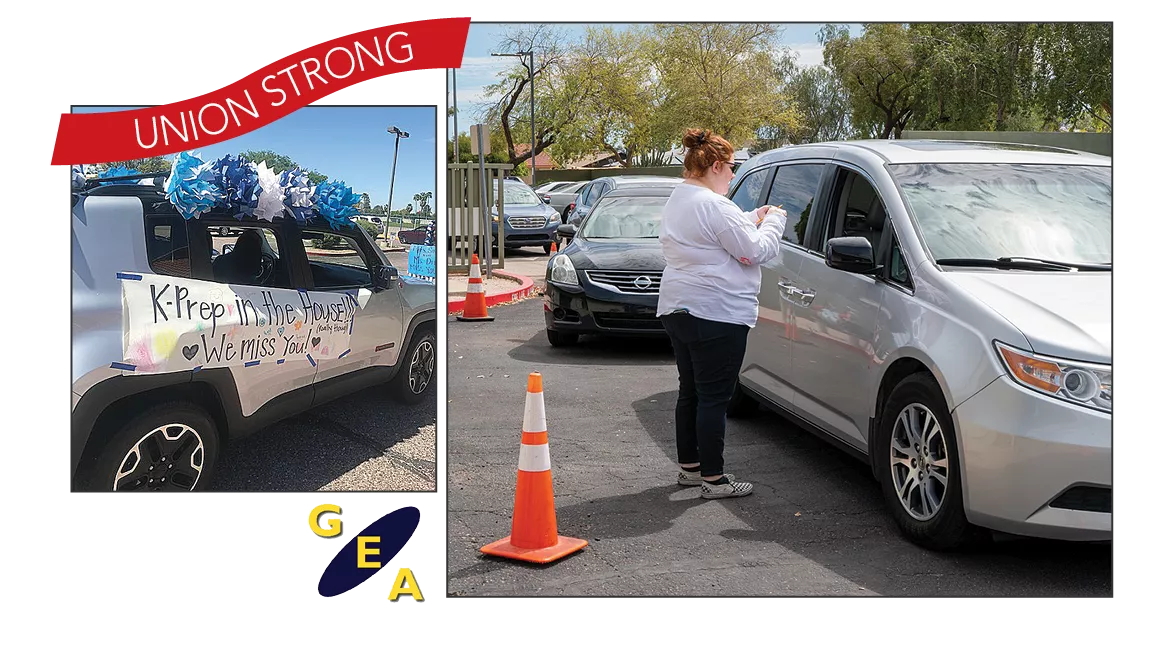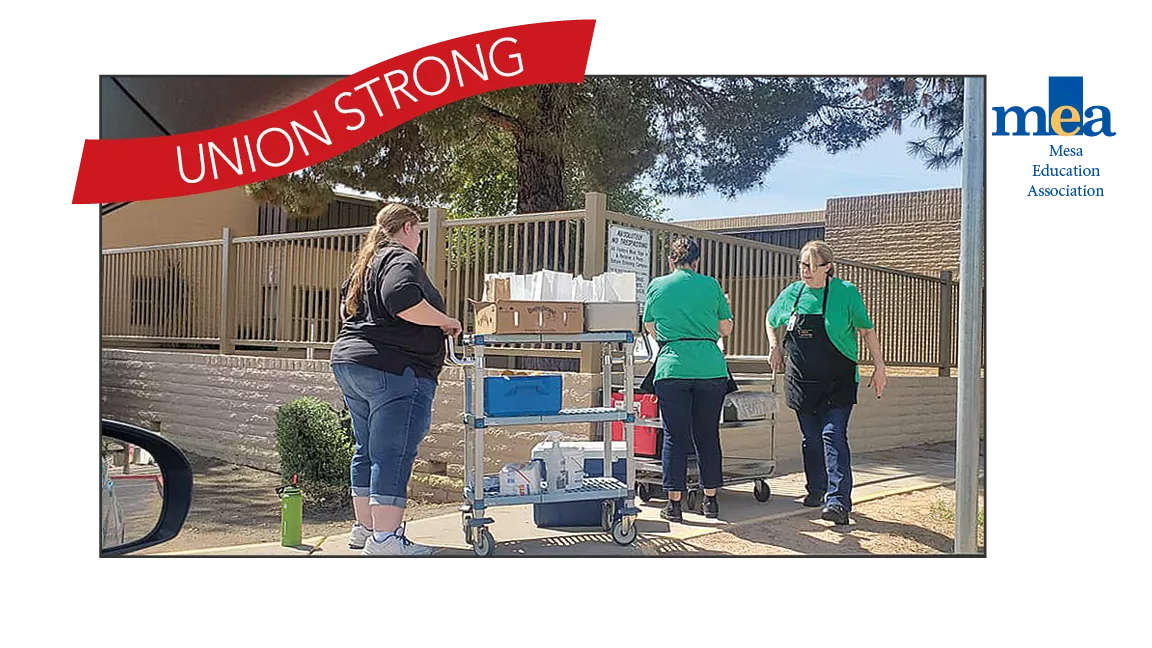For example, some districts tie performance pay to attendance. You should confirm with your district that educators’ absence from school due to closures or exposure to COVID-19 will not be held against them for this or other purposes. If you are on a performance improvement plan, you should request an extension at the appropriate time. You should also acquaint yourself with relevant governing board policies, including GBGCB/GBGCB-E, which deal with communicable diseases (staff exclusion from school, reporting of diagnosed and suspected cases and notification, and confidentiality). Separate guidance on the questions your local association should be asking will be forthcoming.
If you are a member and have any questions about your employment rights or any related concerns, please contact your local association or AEA Help Desk at aeahelpdesk.org or (877) 820-1983.
Disclaimer: What follows is general information on employee rights in the context of the COVID-19 outbreak in Arizona. Employee rights and responsibilities may vary in some respects from district to district and from position to position. For example, individual employment contracts, meet-and-confer agreements, and governing board policies and regulations may differ in significant ways by district and by employee classification. This AEA Legal Department publication is for informational purposes and is not intended as a substitute for legal or other professional advice based on or addressing one’s specific circumstances.
FAQ for Employees While Schools Are Closed
QUESTION: The Governor and the Superintendent jointly announced that all schools are closed statewide for the rest of the school year. Can my district still make me report to work, notwithstanding the closures? If I am asked to work during school closures, will I get paid?
ANSWER: Yes, your district may ask you to report to work as usual or to work remotely from home. You would be paid for your work in either event.
QUESTION: Will I get paid for days on which the school is closed?
ANSWER: Yes, you will get paid if:
- You are committed to being available to work and/or working (whether remotely or onsite) under HB 2910 and various district governing board resolutions; or
- You utilize paid leave in the event you are unavailable or unwilling to work, including:
- Emergency paid sick leave under federal law (qualifying reasons, eligibility, and other terms explained above) on or after April 1;
- Public health emergency leave under federal law (qualifying reason, eligibility, and other terms explained above) on or after April 1;
- Earned paid sick time under state law in the event of an employee’s/family member’s illness or medical care or in the event of a public health emergency1.
Note: 1 Under the earned paid sick time law, a district must allow you to utilize accrued sick time in order to receive pay for, among other things, (1) time used to seek medical care or for illness of the employee or the employee’s family member (an employer may not ask for a doctor’s note until the third consecutive day) or (2) under certain circumstances during a public health emergency. Specifically, an employee may use sick time during a public health emergency in the event of the Closure of the employee’s place of business by order of a public official due to a public health emergency or an employee’s need to care for a child whose school or place of care has been closed by order of a public official due to a public health emergency, or care for oneself or a family member when it has been determined by the health authorities having jurisdiction or by a health care provider that the employee’s or family member’s presence in the community may jeopardize the health of others because of his or her exposure to a communicable disease, whether or not the employee or family member has actually contracted the communicable disease. See A.R.S. § 23-373(A)(3).
- Other accrued available leave (e.g., personal leave or vacation).
- If you are an FLSA-exempt non-teaching employee, you should receive your full salary for any weeks where you perform any work despite school closures, although you may have to use accrued leave benefits to the extent they are available. This rule does not apply to teachers, but could apply to school nurses, administrators, some managers or directors, school psychologists or occupational therapists, speech language pathologists, some who work in the technology or business offices, and others.
QUESTION: Is there a legal reason why my district is now requiring me to indicate my commitment to being available to work?
ANSWER: This is based on your district’s interpretation of the School Closures Act. Section 1(C)(6)(a) of HB2910 requires that “[b]efore March 30, 2020, each public school employee, including hourly employees, shall commit to be available to work during the employee’s normal work hours.” It is not clear that this language requires employees to affirmatively state to the district that they will be available to work. Instead, many districts will likely assume employee commitment to being available to work unless employees indicate they will be unavailable or unwilling to work on some occasions. If your district requires you to state your commitment to work availability, then your district should make the process as simple and streamlined as possible. It could be as simple as an email to the district saying “I am hereby committing to be available to work during my normal work hours for the duration of the school closure, except to the extent I indicate in the future that I am unavailable to work on particular dates.”
QUESTION: Is there any limit on how long my school can remain closed?
ANSWER: Schools could potentially remain closed indefinitely. In a state of emergency, state officials, state or county health departments, or public school districts may close schools to protect public health and the safety of staff and students. At present, all schools are closed for four weeks by the order of state officials. There are obviously practical and legal reasons why districts would not want to keep schools closed indefinitely, including state testing and instructional time requirements. However, we may see these requirements waived at the federal and state levels.
QUESTION: I teach students with disabilities. What do I need to know about providing services to students with disabilities during school closures due to the COVID-19 outbreak?
ANSWER: While schools are closed and educational services are not being provided to the general student population, the district is not required to provide services to students with disabilities during that same period. However, if the district continues providing educational opportunities to the general student population during the closure, then the district must ensure that students with disabilities have equal access to the same opportunities. Please refer to the Q&A released by the U.S. Department of Education or ask your district special education director for further information.
AEA Members Meet the Needs of Their Communities
FAQ for Employees Once Schools Reopen or When Reporting for Work
QUESTION: I am concerned about getting the coronavirus when I report to work. What obligation or incentive does my employer have to protect me and other staff from COVID-19?
ANSWER: Your employer has a statutory duty to furnish a workplace “free from recognized hazards that are causing or are likely to cause death or serious physical harm to . . . employees.” In addition, district policies and regulations, such as CCB-R and GBGCB, likewise require the district to safeguard the health of employees and to take reasonable and lawful measures to protect staff members from the transmission of communicable diseases. In addition, employers have financial incentives to avoid work-related injuries, the spread of infectious diseases, or any lost time. It is also the right thing to do.
If you are aware of any circumstances that suggest your workplace is not safe, you should report any such concerns to your site administrators or human resources department. For example, if your school has had a suspected or confirmed case of COVID-19 and your district is not complying with CDC recommendations for environmental cleaning and disinfection, you should report your concerns immediately. It is advisable to submit the concerns both verbally and in writing. You may ask your local association representative to assist you. If the district does not address any recognized hazards, you may also consider submitting a Notice of Alleged Safety or Health Hazards Form to the Arizona Department of Occupational Safety and Health.
QUESTION: I have a condition that leaves me especially vulnerable to infection. What, if any, obligation does my employer have to me under these circumstances?
ANSWER: If you are a person with a disability, you may be entitled to receive a reasonable accommodation from your employer if you can still perform the essential functions of the job. Ideally, you should obtain a statement from your healthcare provider that your immune system is compromised (or other justification, as appropriate) and that it is unsafe for you to be in the general public, including in your classroom during a pandemic. You should contact your local association representative to accompany you to human resources to begin the interactive process with your employer under the Americans with Disabilities Act (ADA). Potential accommodations include reassignment to the district office, working remotely/coordinating or providing e-learning, or leave for a period of time. The accommodation ultimately selected must be both reasonable and effective.
Also, your district has a duty to inform staff members who are known to have special vulnerability to an infection if an outbreak of a communicable disease occurs at school.
QUESTION: Can my employer require me to work from home during this pandemic?
ANSWER: Yes, an employer may, but is not required to, assign you to work from home. However, under HB 2910, school employees who are able to perform their work tasks remotely will be required to work remotely beginning on March 30, 2020 through the duration of the statewide closure (under the language of the statute, “the employee shall work remotely” after this date). Under this act, other school employees who are unable to perform their work tasks remotely will be assigned other tasks through the duration of the statewide closure.
QUESTION: Do I have a right to stay home and not work with everything that’s going on with the pandemic?
ANSWER: Generally speaking, no. However, you may be able to take time off by utilizing paid leave benefits, potentially including emergency paid sick leave or public health emergency leave (under federal law), earned paid sick time (under state law), or other available leave (e.g., personal leave or vacation). These benefits are discussed in prior sections of this FAQ. You may also be able to take traditional unpaid leave under the FMLA (for an employee’s own serious health condition or to care for another with a serious health condition) or leave as a reasonable accommodation for a staff member with a disability under the ADA. Finally, you may be able to refuse to work if you can show there is an imminent or immediate risk of death or serious physical harm. Based on the overall picture of community spread in Arizona, it is not clear that such conditions exist presently. If you are feeling an overwhelming sense of unease, stress, or anxiety about the COVID-19 pandemic, your district may offer an Employee Assistance Program (EAP) that would allow you to speak with a professional who can assist you.
QUESTION: May I use sick leave if I have to stay at home with my child because my child’s school is closed due to the COVID-19 outbreak?
ANSWER: You may use, under federal law, emergency paid sick leave and/or public health emergency leave and, under state law, earned paid sick time to care for a child whose school or place of care has been closed due to the coronavirus. Paid leave for caring for a child whose school is closed under federal law is limited to two-thirds of an employee’s regular rate of pay up to $200 per day. These paid leave benefits could be stacked (likely taking the federal benefits first) or used as near substitutes for one another (for example, you may choose to utilize earned paid sick time under state law to receive your full, regular pay rather than utilizing federal paid leave options).
QUESTION: Under what circumstances is my employer able to send me home from school, and can my employer keep me out of school for a while?
ANSWER: Your employer may send you home or keep you away from school if you exhibit symptoms of COVID-19 or otherwise present a direct threat to the health and safety of others in the school workplace based on directives and recommendations from ADHS and county health officials and the best available medical knowledge. Visit the ADHS website for the current recommendations. Under existing board policies, a district may require a staff member who is excluded from school due to a communicable disease to be assessed by a school nurse or a designee or to submit a physician’s written medical release prior to returning to work. Under these circumstances, you could use sick leave to receive pay while you are away from work.
QUESTION: Is my employer legally permitted to take my temperature at school to see if I have a fever, which is a symptom of COVID-19, or to ask me questions about any symptoms a family member or I may have?
ANSWER: While it is not entirely clear if having COVID-19 constitutes a disability under the ADA, many are assuming it is at the present time. If so, asking questions, such as “Do you have coronavirus?” (or COVID-19), may be a disability-related inquiry, although an employer is likely permitted to ask you if you are experiencing specific symptoms of COVID-19 as outlined by public health officials. However, your employer may not ask about a family member’s symptoms or exposure to COVID-19 under the Genetic Information Nondiscrimination Act (GINA). Taking an employee’s temperature at work to screen for COVID-19 would constitute a medical examination under the ADA. This means your employer would have to prove that such measures are job related and consistent with business necessity or that an employee poses a direct threat to the health and safety of others. The employer must keep the exam and results confidential.
QUESTION: What should I do if one of my students exposes me to COVID-19?
ANSWER: Consult with your healthcare provider immediately and report the exposure to the administration. Your provider may determine that you should be tested for COVID-19.
QUESTION: What should I do if I end up getting COVID-19?
ANSWER: You should stay home and seek medical care as needed. You should only return to work in accordance with district policies and the recommendations of public health officials (see above). While off work, you can utilize paid sick leave under federal or state law and potentially other benefits. If you need extended leave, you may be able to apply for leave under the Family Medical and Leave Act (FMLA). If your provider says you cannot perform your job for some time, and you have short term disability insurance, you should apply for those benefits. Finally, if you end up getting COVID-19 and can prove that exposure occurred through your work activities, you may be able to file a workers’ compensation claim as well. We would encourage you to report if you are diagnosed with COVID-19 to your supervisor, human resources, and/or district administration for several reasons, including out of concern for others at school who may have been exposed. You also must notify your employer of the infection if you plan to file a workers’ compensation claim.
QUESTION: What will my school district tell others about me if I end up getting COVID-19?
ANSWER: School districts must maintain the confidentiality of staff members’ medical conditions, including the identity of a staff member who has a communicable disease and the nature of the disease. However, districts may have to disclose some information under specific circumstances. Among other things, a district may have to report diagnosed or suspected cases of a communicable disease to public health officials (the reporting requirement set forth in the regulations does not currently include COVID-19) or disclose the existence of a diagnosed or suspected case of COVID-19 to staff members or students to enable them to protect themselves from any direct threat to their health and safety.
Suggested Further Reading
Student success is about their future. And ours.





